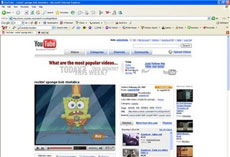Viacom sues YouTube over copyrights
(AP)Updated: 2007-03-14 10:24
NEW YORK - Big Media took its first big swing at YouTube Tuesday as Viacom Inc., the owner of MTV, VH1, Comedy Central and other cable networks filed a $1 billion copyright lawsuit against the video-sharing site and corporate owner Google Inc.
Last month Viacom demanded that YouTube remove more than 100,000 unauthorized clips from its site, and since that time the company has uncovered more than 50,000 additional unauthorized clips, Viacom spokesman Jeremy Zweig said.
A quick search of YouTube's site Tuesday turned up numerous clips from Viacom programs including segments from Comedy Central's "The Daily Show with Jon Stewart" and Nickelodeon's "SpongeBob SquarePants" cartoon.
In the lawsuit, filed in U.S. District Court in New York, Viacom says YouTube "harnessed technology to willfully infringe copyrights on a huge scale" and had "brazen disregard" of intellectual property laws.
YouTube's soaring popularity has been a cause of fascination but also fear among the owners of traditional media outlets, who worry that YouTube's displaying of user-uploaded clips from their programs -- without compensation -- will lure away viewers and ad dollars from cable and broadcast TV.
Viacom is especially at risk because many of its shows are aimed at younger audiences who also are heavy Internet users. At the same time, Viacom is trying to find other, legal ways to distribute its shows digitally, such as by selling episodes of "The Daily Show" and "South Park" for $1.99 each through Apple Inc.'s iTunes service. Those shows can then be viewed on a computer or video iPod.
YouTube says it cooperates with all copyright holders and removes programming as soon as it is notified. But Viacom argues that approach lets YouTube avoid taking the initiative to curtail copyright infringement, instead shifting the burden and costs of monitoring the site onto copyright holders.
Alexander Macgillivray, associate general counsel for products and intellectual property at Google, said YouTube was protected under the 1998 Digital Millennium Copyright Act, which gives online service providers protection from copyright lawsuits so long as they comply with requests to remove unauthorized material.
"We're saying that the DMCA protects what we're doing," Macgillivray said in an interview. On the other hand, he said, "The DMCA is silent on what we have to do if we don't get a notice" to remove material.
Other media companies have also clashed with YouTube but some, including CBS Corp., have agreed to provide some clips to the site. CBS Corp. used to be part of Viacom but has since split off into a separate company.
Universal Music Group, a unit of France's Vivendi SA, had threatened to sue YouTube, saying it was a hub for pirated music videos, but later reached a licensing deal with them.
Despite those arrangements, media's relations with YouTube remain testy. CBS's CEO Leslie Moonves told investors last week that its pact with YouTube had provided a big promotional boost for its shows. But he added that many big technology players "don't quite respect the content enough," although that was changing.
General Electric Co.'s NBC network has set up a channel to show authorized clips on YouTube, but it recently criticized the site and Google for not doing more to prevent copyrighted material from being posted online.
Bruce Sunstein, co-founder of intellectual property law firm Bromberg & Sunstein in Boston, said YouTube was still in the early stages of what was likely to be a "very long working-out of arrangements" with the owners of broadcast copyrights.
"Finding a way of peaceful coexistence is quite a struggle," Sunstein said. "Google's motto is 'Don't be Evil,' and you could argue that with YouTube that motto is wearing a little thin."
Unlike the original Napster file-sharing service, which was shut down following complaints from music companies that it encouraged piracy, Sunstein said he expected YouTube and its corporate owners to eventually make peace with broadcasters. "I think YouTube very much wants to be legitimate," Sunstein said.
That doesn't mean other lawsuits won't follow Viacom's, however. Now that Viacom has thrown the first punch, other media companies may join the fray, warned Standard & Poor's analyst Scott Kessler in a research note.
A major lawsuit against YouTube has been widely anticipated because so much of the online video pioneer's success has been driven by easy access to copyrighted clips shared by its users.
Google began bracing for a legal onslaught last fall when it withheld nearly $220 million of YouTube's acquisition price in an escrow account. The Mountain View-based company also has another $11.2 billion in cash.
American Technology Research analyst Rob Sanderson believes Viacom filed the suit to pressure Google into setting clear ground rules and fees for the usage of copyrighted content.
"This is all about a media company trying to protect its future," Sanderson said. "It's not about them trying to get damages for the past sins of YouTube."
While YouTube has yet to generate much revenue, its online traffic has been growing rapidly. According to comScore Media Metrix, YouTube attracted 133.5 million visitors worldwide in January, up from 9.5 million a year earlier.
Google shares fell $11.72, or 2.6 percent, to close at $443.03 on the Nasdaq Stock Market amid an overall decline in the stock market, while Viacom's Class B shares fell 9 cents to $39.48 on the New York Stock Exchange.
|
||
|
||
|
|

